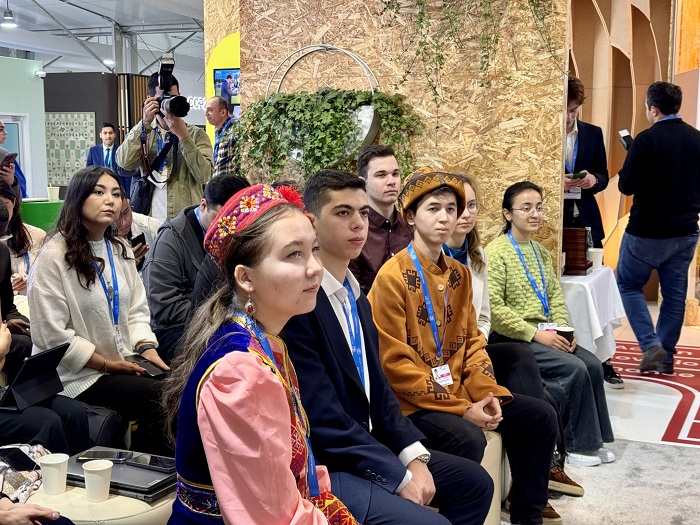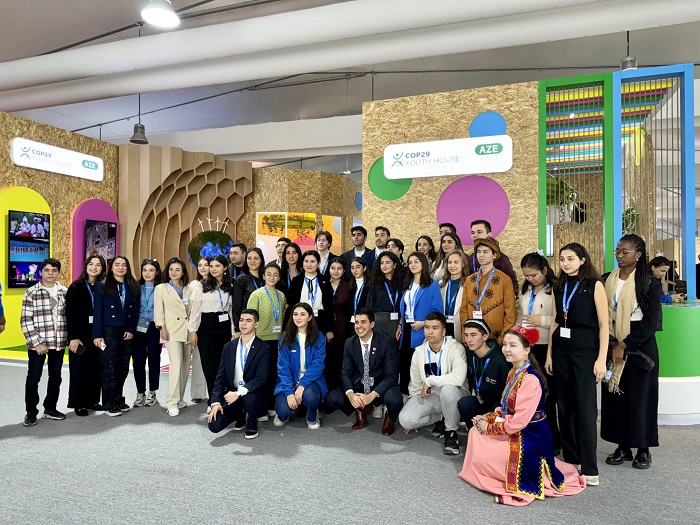Youth climate activists from Central Asia and Turkic countries discussed how youth can drive climate action at the 29th United Nations Climate Change Conference (COP29) in Baku on Nov. 13.
The event, dubbed Next COP Dialogue of Central Asian and Turkic Youth Climate Leaders, convened young environmental advocates from Azerbaijan, Hungary, Kazakhstan, the Kyrgyz Republic, Tajikistan, Turkmenistan, Türkiye, and Uzbekistan to share climate initiatives developed during regional and international ecological camps.
In 2024, youth from Azerbaijan, Türkiye, Hungary, and five Central Asian states came together to draft a youth statement with actionable recommendations on expanding access to environmental education, green skills, and youth participation in the climate agenda.
These recommendations were subsequently incorporated into the International Strategy to Promote Culture of Sustainable Development and Involvement of Children and Youth in the Climate Agenda for 2024-2030. The governments of all eight countries signed this framework on Nov. 12 in Baku.
Building on the momentum of this collaboration, the workshop at COP29 sought to deepen youth engagement by encouraging participants to draft potential work plans for the upcoming year, leveraging the ideas and initiatives discussed at the conference.
 Saida Mammadova from Azerbaijan stressed the need for climate education to be accessible to all. “Green education should be accessible to everyone at all education levels. Youth engagement platforms are also extremely important in our climate action. That is why we need an effective and inclusive platform for young people to join our climate effort,” she said, addressing the event.
Saida Mammadova from Azerbaijan stressed the need for climate education to be accessible to all. “Green education should be accessible to everyone at all education levels. Youth engagement platforms are also extremely important in our climate action. That is why we need an effective and inclusive platform for young people to join our climate effort,” she said, addressing the event.
“At our eco-camps, we have seen the power of collaboration, as the young people from Central Asia, Azerbaijan, Hungary, and Turkiye came together, presented their innovative ideas, and developed a roadmap for action. We have established an international advisory committee, which consists of young people from all countries and ministers responsible for youth affairs, education, and environment,” said Dilnozaxon Kattaxonova, first deputy director of the Youth Affairs Agency of Uzbekistan.
Fifteen-year-old Salohiddin Abdufattokov from Tashkent noted the consequences of climate change hit the youth the hardest.
“That is why governments should ask and get an idea of what is happening with the youth and the impact. Youth should be engaged in decision-making, government policies, rules, and initiatives,” Abdufattokov said in a comment for this story.
He emphasized that the effects of climate change will compound as today’s youth grow into adulthood. Without urgent action, young people face a lifetime of dealing with worsening climate impacts.
When asked what measures must be taken to drive youth-led climate initiatives across Central Asia, he noted the need for a single coordinated network.
“The main thing is collaboration between governments of Central Asian and Turkic countries and youth networks. We need to build one network of youth in Central Asia and analyze what the youth is suffering from [in terms of climate change] because the region is similar,” he added.
Young people, particularly children, are indeed the worst hit by climate change, as data from the UN Children’s Fund (UNICEF) shows. Approximately one billion—nearly half of the global child population—reside in one of the 33 countries classified as extremely high-risk due to climate hazards.
Extreme heat is a growing concern, with one in five children—approximately 466 million—living in areas that now experience at least double the number of extremely hot days annually compared to six decades ago. This increase in temperature correlates with a 5% rise in the odds of stillbirths and preterm births for every one-degree Celcius increase.
COP29 opened on Nov. 11 in Baku and will run through Nov. 22. Kazakhstan presents its national pavilion at the event for the first time. President of Kazakhstan Kassym-Jomart Tokayev is also on an official visit to Baku, where he addressed the World Leaders Climate Action Summit on Nov. 12 and held multiple meetings to promote Kazakhstan’s climate agenda and build partnerships. ///cross post from The Astana Times, 13 November 2024
